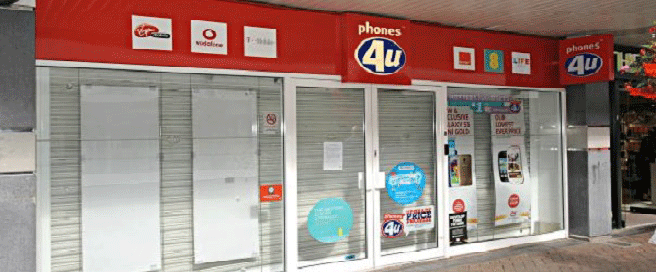Author: Andrew Tongue, research director, International Car Distribution Programme
"Last week, in the largest UK retail failure since the demise of electronics retailer Comet in 2012, the mobile phone chain Phones 4U pulled down the shutters on its 550 stores, and brought in administrators PricewaterhouseCoopers to determine the fate of its 5,500 employees.
"Just another casualty of the decline of the High Street, or were there more sinister forces at work? And what are the lessons for us in the retail automotive sector?
"It didn’t take long for the recriminations to start flying. Many bemoaned the short-term personal profit motivations of the private equity groups for loading the business with debt to the point where its strategic options were critically limited.
"BC Partners bought Phones 4U in 2011 in a highly leveraged deal which left the company with debts of £635 million, but had recently recouped its initial investment, with interest, following a £200 million bond issue which had delivered it a one-off dividend.
"Others, including Phones 4U’s founder John Cauldwell, highlighted how the fatal blow was delivered by the mobile phone network operators when they decided to stop routing their business through the retailer.
"Having already lost O2 and 3 some time ago, once EE and finally Vodafone (the UK’s largest operators) decided to follow suit, then the shops were effectively left with nothing to sell (much of the business revolved around commission payments for signing up customers to new network contracts), and with little option but to close.
"The fact that, over the past few days both Vodafone and EE have concluded deals to take over and rebrand a number of stores (140 and 58 respectively) has led some to speculate that the network operators deliberately engineered the collapse of the chain so as to be able to ‘cherry-pick’ the best of its retail locations.
"But beyond the accusations, and the huge personal tragedies for those whose jobs have been lost, the fact remains that the retail landscape is changing, in mobile phones just as in the automotive sector.
"The mobile phone market is now a highly mature one; margins are under pressure, the network operators compete head-on for customer retention, and sophisticated customers are performing more of their operator and phone selection online, with less need of in-store comparison advice than used to be the case.
"Many of us still value being able to see, feel, and test a new phone before we commit to it, and the ability to compare different phones on different networks in store with informed advice on which combination might best suit our needs is a key reason for visiting stores such as Phones 4U and Carphone Warehouse, and something that is not possible for the new car buyer, despite over half of those we polled in a recent car buyers survey indicating that they would welcome the format.
"However, on the other hand, many more of us will order our next phone online, unseen and untested, as the recent iPhone 6 launch testifies, as does the fact that 40% of our car buying respondents did not test drive the model that they ended up going home with.
"You have to wonder whether, in a few short years’ time, whether Vodafone and EE will find that a number of the outlets they are about to acquire will be surplus to their needs …
The questions that this raises for mobile phones are increasingly familiar ones to the automotive sector:
• What are the merits of distributing via independent retailers as opposed to using a ‘direct’ online/offline network?
On the one hand, much of Phones 4U’s initial success was built on its retail presence, selling skills, and youthful marketing being able to deliver certain types of customer (especially younger ones) to the networks that their own direct channels were struggling to attract.
But, on the other hand, the advice that an independent retailer gives may not always be favourable to the network’s interests, and a direct channel can give consistency of presentation, a relationship with the customer … whilst also removing the need to pay a retailer’s margin …
• Does the elimination of a physical channel which provides the customer with the opportunity to make cross-brand comparisons strengthen the hand of the network operators by filling some (presumably) open points, or does it just push more consumers online to price comparison sites, where arguably the mobile network operators will have even less influence than they did through Phones4U?
• Finally, the role of the physical retail network altogether in supporting the brand and in supplying and servicing its products: how is this changing, and what does this mean for future network density? In the mobile phone business, this rather depends on whether you believe that customers are loyal to network operators, or to their preferred brand of handset.
But either way, and unfortunately for those involved in urban planning, the internet will continue to challenge the need for retail presence in every High Street."















gezza06 - 25/09/2014 15:58
Can't see car manufacturers going down the direct sales route, there needs to be a dealer in the middle to prepare and deliver the car and sort out any problems. Unlike a phone which can simply be posted direct to the end user. Customer satisfaction would suffer without the dealers.